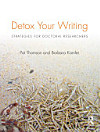Detox Your Writing: Strategies for doctoral researchers
About this ebook
The book addresses the problems that most doctoral researchers experience at some time during their candidature – being unclear about their contribution, feeling lost in the literature, feeling like an imposter, not knowing how to write with authority, wanting to edit rather than revise. Each chapter addresses a problem, suggests an alternative framing, and then offers strategies designed to address the real issue.
Detox Your Writing
is intended to be a companionable work book – something doctoral researchers can use throughout their doctorate to ask questions about taken-for-granted ways of writing and reading, and to develop new and effective approaches.The authors’ distinctive approach to doctoral writing mobilises the rich traditions of linguistic scholarship, as well as the literatures on scholarly identity formation. Building on years of expertise they place their emphasis both on tools and techniques as well as the discursive practices of becoming a scholar.
The authors provide a wide repertoire of strategies that doctoral researchers can select from, rather than a linear lock step progression through a set of exercises. The book is a toolkit but a far from prescriptive one. It shows that there are many routes to developing a personal academic voice and identity and a well-crafted text. With points for reflection alongside examples from a broad range of disciplines, the book offers thinking tools, writing tools, linguistic tools, and reading tools which are relevant to all stages of doctoral research.
This practical text can be used in all university doctoral training and composition and writing courses. However, it is not a dry how-to-do–it manual that ignores debates or focuses solely on the mechanical at the expense of the lived experience of doctoral research. It provides a practical, theorised, real-world, guide to postgraduate writing.
About the author
Barbara Kamler is an Emeritus Professor at Deakin University and an Honorary Professor at The University of Sydney. Thomson is Professor of Education and Director of the Centre for Advanced Studies at The University of Nottingham, a special Professor at Deakin University and an adjunct Professor at the Free University, South Africa. She blogs regularly on doctoral education on wwwpatthomson.wordpress.com
Kamler and Thomson have an established reputation in the field. Thomson is an active PhD supervisor and both conduct writing workshops for universities in a range of locations. They have written a number of articles, book chapters and two other books together: Helping doctoral students write: pedagogies for supervision (2006) and Writing for peer reviewed journals: Strategies for getting published (2012). Kamler is co-editor of Publishing pedagogies for the doctorate and beyond (2010). Thomson is co editor of The Routledge Doctoral Students Companion and The Routledge Doctoral Supervisors Companion (2010). The books are all published by Routledge.






